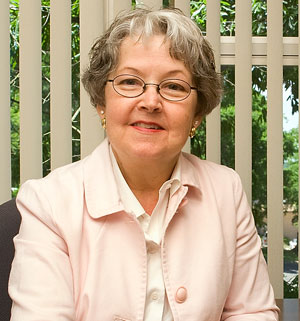CJ Prof Discusses Elderly Abuse Statistics
May 13, 2010
SHSU Media Contact: Linda Borja
 Some two million Americans age 65 or older, many of them in Texas, are injured, exploited, or mistreated by someone they depend on for care or protection, according to nationwide estimates.
Some two million Americans age 65 or older, many of them in Texas, are injured, exploited, or mistreated by someone they depend on for care or protection, according to nationwide estimates.
The Senate Special Committee on Aging estimates there are actually as many as five million victims every year rather than two million.
Texas, with approximately three million persons age 60 or older, has the fourth largest population of elderly adults, following California, Florida, and New York.
The elderly face many different forms of abuse ranging from scamming to homicide, according to Sam Houston State University criminal justice professor Victoria Titterington, who is an expert on the types of crimes and reasons for abuse toward the elderly in today’s society.
In 2007, the National Domestic Violence Hotline reported 4,615 callers were of the age 55 years and older. Ten percent of those callers were from Texas.
“It is estimated that for every one case of elder abuse, neglect, exploitation, or self-neglect reported to authorities, about five more go unreported,” Titterington said.
“The U.S. Bureau of Justice indicates that property crime provides the highest percentage of crimes against persons age 65 or older. This includes thefts, home burglaries, scams, and fraud,” said Titterington.
Elders are vulnerable to financial abuse and exploitation for many reasons.
“As a group they have more assets than younger people,” said Titterington. “The present generation of elders tends to be more trusting of others and often feel compelled to help a door-to-door scammer whom they mistakenly believe is down-on-his-luck,” said Titterington.
Senior citizens who are socially isolated also tend to be more susceptible to scams or fraudulent activities because of their need for attention or contact with others as well as their lack of protection from caregivers or neighbors, according to Titterington.
“To make matters worse, many elders, upon realizing that they have been conned in some way, are too embarrassed to tell anyone, or are fearful that if their family realizes what has happened they will be institutionalized,” said Titterington.
When it comes to financial exploitation of the elderly by family members, the abusers tend to rationalize their behavior.
According to Titterington, some feel they must keep their parents from wasting their money while others feel a sense of entitlement to the money they assume will belong to them in the future. Some exploit their parents financially because they feel it is owed to them after caring for their aging parents.
“Elders can be abused by anyone , in the home, nursing homes, or other institutions,” said Titterington. “Yet with so much attention upon nursing home abuse, it’s important to point out that in almost 90 percent of elder abuse and neglect incidents the perpetrator is a family member,” she said.
Some cases of physical abuse toward the elderly in the home can be explained by caregiver stress, and “elders with Alzheimer’s disease or other forms of dementia are at significantly high risks of being abused,” she said.
Titterington explained that there are many other cases where, “in opposition to the caregiver stress explanation, many abusive family members are themselves dependent upon the elder for financial and other forms of security.”
Although elder abuse is a serious problem in today’s society, many cases of abuse or neglect go unreported.
The senior population is steadily increasing due to longer life expectancies and as the population lives longer crimes against the elderly may steadily increase as well, according to Titterington.
“People age 60 or older are the fastest growing segment of the population, in Texas and nationally. The number of older Americans is expected to more than double in the next 30 years,” she said.
The National Center on Elder Abuse provides tips on what can be done to minimize elder abuse. Becoming more involved with elders in the community and also reporting any unusual activities can help against crime and abuse toward the elderly.
“Texas is among a few states whose statutes mandate that anyone, not just health or social service professionals, who suspects elder abuse should report it,” said Titterington.
To report suspected elder abuse, neglect, or exploitation in Texas, call 1.800.252.5400.
—End—
This page maintained by SHSU's Communications Office
Director: Bruce Erickson
Assistant Director: Julia May
Writer: Jennifer Gauntt
Located in the 115 Administration Building
Telephone: 936.294.1836; Fax: 936.294.1834
Please send comments, corrections, news tips to Today@Sam.edu.

 SamWeb
SamWeb My Sam
My Sam E-mail
E-mail

